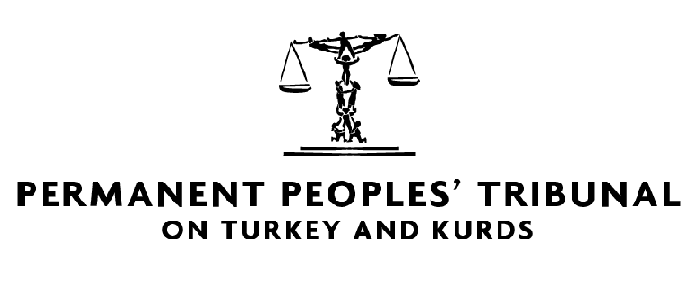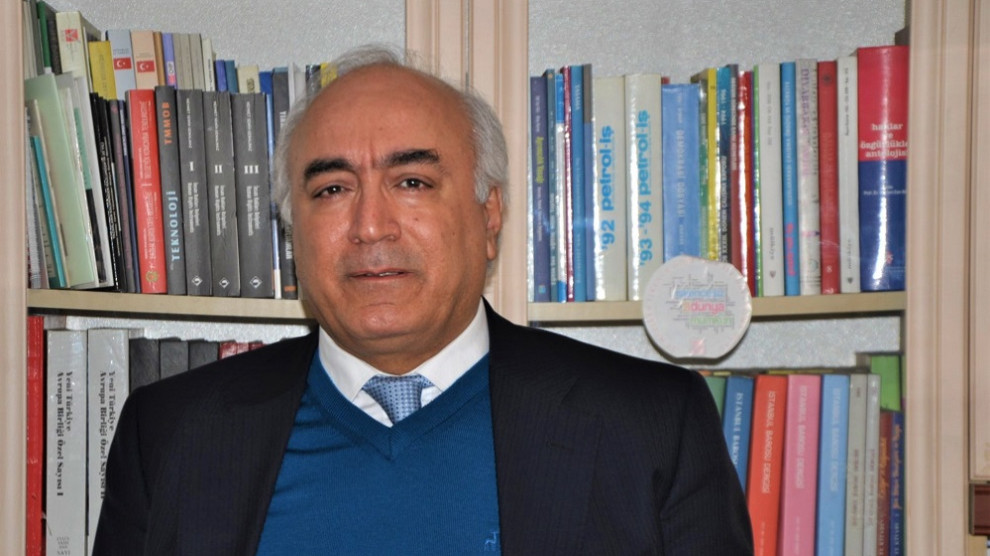
The session of the Permanent Peoples Tribunal on alleged violations of international law and international humanitarian law by the Turkish Republic and its officials in their relations with the Kurdish people and their organisations has kicked off in Paris, France.
The two-day sessions on Thursday and Friday will focus mainly on the crimes committed in the term of Turkish President Recep Tayyip Erdogan who is among the leading suspects over responsibility for these crimes. Government, military and intelligence officials are also among those to be tried in the tribunal.
The tribunal will handle two main cases, one being the attacks in which Kurdish towns were razed to the ground and civilians were massacred in Cizre, Sur, Şırnak and Nusaybin, the other being the triple murder of Sakine Cansız, Fidan Doğan and Leyla Şaylemez in Paris on 9 January 2013. Many other crimes committed by the Turkish state will also be handled from several aspects.
7 JUDGES HEAD THE TRIBUNAL
The President of the PPT, Philippe Texier, will chair the panel of the judges, which is composed by Madjid Benchikh, Luciana Castellina, Teresa Almeida Castro, Domenico Gallo, Denis Halliday, Norman Paech.
Philippe Texier: President of the Permanent Peoples’ Tribunal. He is an honorary judge at the Cassation Court of France. He was a member of the Committee on Economic, Social and Cultural Rights of the United Nations High Commission for Human Rights from 1987 to 2008 and its Chairperson from 2008 to 2009. He was director of the Human Rights Division of ONUSAL (UN Mission in El Salvador) from 1991 to 1992, and an independent expert of the Human Rights Commission in Haiti from 1988 to 1990.
Madjid Benchikh: Professor Emeritus of the University of Cergy-Pontoise (Paris-Val d’Oise) where he also directed the Doctoral School of Law and Humanities. He was Dean and President of the Scientific Council of the Faculty of Law of Algiers. He coordinated the creation of the Amnesty International section in Algeria of which he was the first president. He was a founding member of the Permanent Peoples’ Tribunal. He has taught in several universities in Algeria and in Europe and published several books including “International Public Law” (Casbah Editions 2016, Algiers). He has organized various struggles to denounce violations of democratic freedoms and human rights in Algeria or in other countries.
Luciana Castellina: Journalist and writer, she has been an exponent of the Italian Communist Party and the Unity Party for the communism, for various legislatures deputy of the Italian Parliament and several times member of the European Parliament. Former Vice-president of the EU Commission on Latin and Central America, she is honorary President of the Arci association and member of the Permanent Peoples’ Tribunal.
Teresa Almeida: Cravo Researcher at the Center for Social Studies and Humanitarian Studies, Migrations and Studies for Peace and Assistant Professor of International Relations at the Faculty of Economics of the University of Coimbra. She is currently co-coordinator of the PhD in Democracy in the 21st Century and coordinator of the Master in International Relations – Peace, Security and Development Studies. She completed his PhD in the Department of Policy and International Studies at the University of Cambridge. She holds a Master’s Degree in Peace Studies from the University of Bradford, Uk, and a Bachelor’s Degree in International Relations from the Faculty of Economics at the University of Coimbra, as well as a Postgraduate Diploma in Human Rights and Democratization at the University of Coimbra. Her research focuses on peace and conflict, security, development, interventionism and foreign policy
Domenico Gallo: Magistrate, he has been serving in the Court of Cassation since 2007, recently taking on the role of President of the Chamber. He was elected Senator in 1994. He has actively participated in the association life and civil society movements active on the theme of peace and the defense of human rights. He has edited numerous publications on issues related to institutional and human rights issues. In 2013 he published “Da sudditi a cittadini il percorso della democrazia” (Ega). He collaborates with the newspapers Il Manifesto and Il fatto quotidiano.
Denis Halliday: He was the United Nations Humanitarian Coordinator in Iraq from 1 September 1997 until 1998. He was previously Deputy Resident Representative to Singapore of the United Nations Development Programme. He holds an M.A.in Economics, Geography and Public Administration from Trinity College, Dublin. After a 34-year career at the United Nations, where he had reached Assistant Secretary General level, Halliday resigned in 1998 over UN sanctions that cut off food supplies to Iraq, characterizing them as “genocidal.” Laureate of the Gandhi International Peace Award, he is member of the Permanent Peoples’ Tribunal.
Norman Paech: He is an Emeritus Professor at Hamburg University, a former member of the German Parliament and an expert in International law. He started his career at the federal Ministry of Economic Cooperation in Bonn. He continued as a researcher at the Research centre of the Federation of German Scientists in Hamburg. In 1975 he became a professor in political science at the University of Hamburg and subsequently taught Public law at the University of Economics and Politics in Hamburg. He was the Chief Editor of the legal-political quarterly Democracy and law and is a member of the Scientific Advisory Board of ATTAC, IALANA and IPPNW.
Magistrate Domenico Gallo opened the session and stated that Turkey has been sent an official invitation for defense at the tribunal, but has not manifested a will for attendance.
The indictment was read out afterwards, by Belgian lawyer Jan Fermon who said they will present evidences of the Turkish state committing murders, abducting people, bombing civilians and destroying their living areas. Referring to the PKK’s struggle, Fermon said; “This is an armed conflict. The Turkish state has systematically spoken of terrorism. The right to self-determination should be arranged in the future.” Fermon pointed out that the Turkish state’s denial, violations and refusal of self-determination is the reason for the violence.
CRIMES ARE NOT INDIVIDUAL, COMMITTED BY THE STATE
Asking the court to present an opinion regarding the crimes that were committed in Turkey in the past and that have not been treated and concluded yet, Fermon pointed out the crimes committed in Şırnak, Cizre, Sur and Nusaybin as he talked about the large scale operations carried out against Kurdish towns. Fermon said this is not fight against terror.
Remarking that courts try individuals alone, Fermon said; “However, the Turkish state acted as a criminal organization as a state. It is not like an individual that commits a crime with personal initiative.”
Noting that there is no mechanism to try Turkey as a state, Fermon asked the panel of the judges to treat the state-organized aspect of the crimes.
Fermon stated that Turkish President Erdoğan held responsibility fort he 2015-2016 incidents where Kurdish towns were destroyed, saying; “The aim was to end the peace process and lead to a conflict.”
Fermon said Turkish military forces used disproportionate force during the operations. Recalling that 2nd Army Chief Adem Hududi of the term is jailed today for links to FETÖ, Fermon continued; “In the Turkish state, various circles are harming and staging coups against each other. They are in a conflict as to who will rule Turkey but they become partners only when Kurds are in question.”
Fermon further recalled that the Turkish government was the reason for Kobane incidents in 2014, and pointed out the ISIS attacks on Kobane and the Turkish state’s relations with these gangs. Fermon also talked about the “Collapse Plan” decided by the Turkish National Security Council to end the peace process, and the repression against the HDP after the June 7 elections.
Showing images from Sur, Cizre, Şırnak and Nusaybin, Fermon said these constituted war crimes.
The court will give its verdict on the case two months after the session. The announcement will be made in a meeting to be held in the European Parliament in Brussels. Members of the European Parliament will be invited to that conference to reflect on the political initiatives that flow from the findings of the Court, in particular on measures to fight impunity. The tribunal is supported by some 300 individuals and 45 international institutions.

